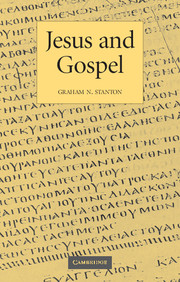Book contents
- Frontmatter
- Contents
- Preface
- List of abbreviations
- 1 Introduction
- PART I JESUS AND GOSPEL
- 2 Jesus and Gospel
- 3 The fourfold Gospel
- 4 Jesus traditions and gospels in Justin Martyr and Irenaeus
- 5 The law of Christ and the Gospel
- PART II JESUS
- PART III THE GOSPELS AND PAPYRI CODICES
- Bibliography
- Index of passages cited
- General index
3 - The fourfold Gospel
Published online by Cambridge University Press: 21 December 2009
- Frontmatter
- Contents
- Preface
- List of abbreviations
- 1 Introduction
- PART I JESUS AND GOSPEL
- 2 Jesus and Gospel
- 3 The fourfold Gospel
- 4 Jesus traditions and gospels in Justin Martyr and Irenaeus
- 5 The law of Christ and the Gospel
- PART II JESUS
- PART III THE GOSPELS AND PAPYRI CODICES
- Bibliography
- Index of passages cited
- General index
Summary
The origins and the theological significance of the fourfold Gospel raise a set of teasing questions. Why did the early church eventually accept four partly parallel foundation documents, no more, no less? There is no precedent for this either in the OT Scriptures or elsewhere in earliest Christianity. Did retention of four gospels assist or hinder the early church in the presentation of its claims concerning Jesus? No doubt, to some, insistence that there were four gospels implied that there were basic flaws in the single gospels. Was the second-century church's decision to bring together four separate gospels wise? What were, and what are, the theological implications of the fourfold Gospel? A critical theology cannot avoid asking these questions.
In the early decades of the twentieth century, the views of the great giants, Theodore Zahn and Adolf von Harnack, were influential: many scholars accepted their view that the fourfold Gospel emerged very early in the se-cond century, well before Marcion. More recently, particularly under the influence of Hans von Campenhausen, most scholars have accepted that the fourfold Gospel emerged in the second half of the second century and that the Muratorian Fragment and Irenaeus are our primary witnesses.
However, the current consensus on the emergence of the fourfold Gospel is now being challenged from two entirely different starting points.
- Type
- Chapter
- Information
- Jesus and Gospel , pp. 63 - 91Publisher: Cambridge University PressPrint publication year: 2004



